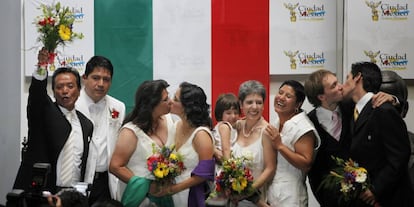Mexico’s President Peña Nieto backs legalizing same-sex marriage
Leader will send Congress proposal for constitutional reform


Mexico took another important step in the fight against discrimination this week after President Enrique Peña Nieto announced he will send a proposal to Congress to amend the Constitution to allow marriage between same-sex couples. The initiative would also require the Foreign Ministry to accept new birth certificates that reflect gender confirmation as valid forms of identification for the issuance of passports. The president made the announcement at an event held at Los Pinos, the presidential residence, to celebrate Mexico’s National Day Against Homophobia, a holiday he created by decree on March 21, 2014.
“It seems simple for us to gather here in Los Pinos but we are turning the page on a new chapter,” said Luis Perelman, an LGBTI activist who spoke at the event. Perelman, the president of the Mexican Federation of Sexual Education and Sexology, recalled how ingrained homophobia is in the country. Forty percent of Mexicans say they are not willing to share their home with a homosexual. “It is one of the few [cases of] discrimination where family is the biggest enemy,” he told the crowd.
The government wants to reform Article Four of the Constitution, which guarantees the rights of the individual, to incorporate the Supreme Court’ June 2015 ruling that gay marriages are equivalent to marriage between heterosexuals. The Court thus legalized this kind of union and declared any law that forbids it unconstitutional. Several Mexican states, however, were reluctant to adapt to the ruling. “We cannot have people in our country who have certain rights in some states but not in others,” Peña Nieto said.
It seems simple for us to gather here in Los Pinos but we are turning the page on a new chapter
Luis Perelman, Mexican LGBTI activist
Mexico will create an amendment to enshrine that right in its Constitution. “I trust that once this change has been approved for the Federal Civil Code it will eventually be added to the civil codes of different federal states that do not yet have it,” the president added.
Gay marriage is legal in eight of Mexico’s 32 states: Campeche, Coahuila, Quintana Roo, Jalisco, Nayarit, Chihuahua, Sonora and Mexico City. Campeche approved same-sex unions on May 11 with 34 votes in favor and just one against. The opposition was Adriana Avilez Avilez, a congresswoman from a leftist party who said: “It goes against all of nature; we can’t mix oil and water.”
Alexandra Haas, president of the National Council to Prevent Discrimination, said even though the World Health Organization removed homosexuality from its list of mental disorders 26 years ago, it remains “a real disease that we have to eradicate.” Peña Nieto has promised that the Ministries of Education and Interior will organize a nationwide campaign to raise awareness against this kind of prejudice. According to Alejandro Brito, executive director of the organization Letra S, there have been 1310 hate crimes committed in Mexico since 1995: 1021 against gays, 265 against transgender women and 24 against cisgender women.
The president has also asked Foreign Minister Claudia Ruiz Massieu to join 19 other UN countries in promoting the rights of homosexuals, lesbians, bisexuals, transgender and intersex people around the world.
English version by Dyane Jean-François.
Sign up for our newsletter
EL PAÍS English Edition is launching a weekly newsletter. Sign up today to receive a selection of our best stories in your inbox every Saturday morning. For full details about how to subscribe, click here.
Tu suscripción se está usando en otro dispositivo
¿Quieres añadir otro usuario a tu suscripción?
Si continúas leyendo en este dispositivo, no se podrá leer en el otro.
FlechaTu suscripción se está usando en otro dispositivo y solo puedes acceder a EL PAÍS desde un dispositivo a la vez.
Si quieres compartir tu cuenta, cambia tu suscripción a la modalidad Premium, así podrás añadir otro usuario. Cada uno accederá con su propia cuenta de email, lo que os permitirá personalizar vuestra experiencia en EL PAÍS.
¿Tienes una suscripción de empresa? Accede aquí para contratar más cuentas.
En el caso de no saber quién está usando tu cuenta, te recomendamos cambiar tu contraseña aquí.
Si decides continuar compartiendo tu cuenta, este mensaje se mostrará en tu dispositivo y en el de la otra persona que está usando tu cuenta de forma indefinida, afectando a tu experiencia de lectura. Puedes consultar aquí los términos y condiciones de la suscripción digital.








































